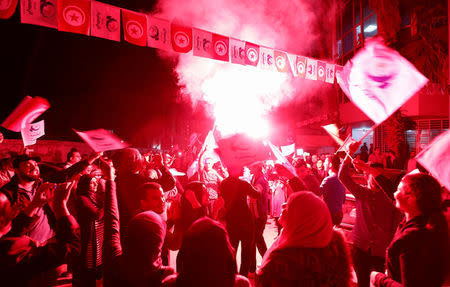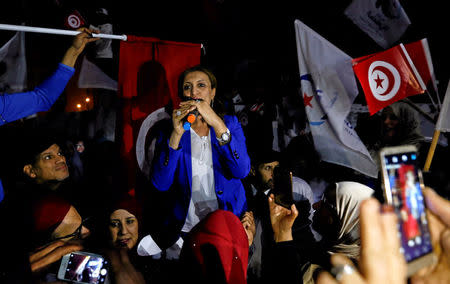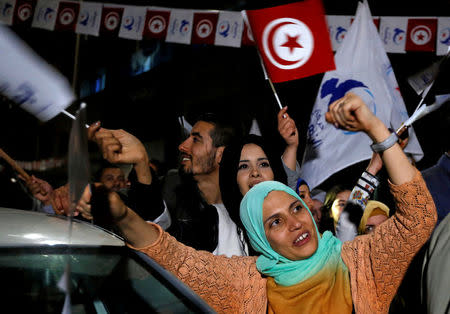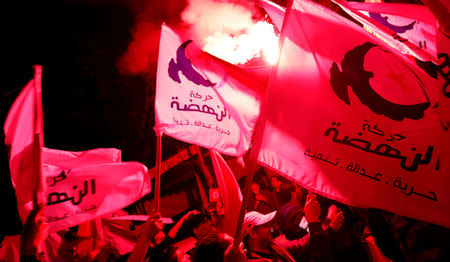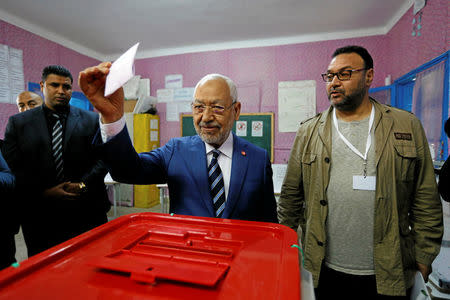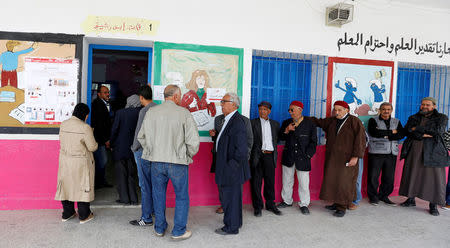Tunisia's Ennahda claims victory in landmark local elections
By Tarek Amara
TUNIS (Reuters) - Tunisia's Islamist Ennahda party claimed victory late on Sunday in the country's first free municipal elections, a key step in a democratic transition marred by economic disappointment.
After polling stations closed at 6 p.m., top Ennahda official Lotfi Zitoun told Reuters the party was more than 5 percent ahead of its secularist rival, Nidaa Tounes, citing vote counts observed by the party.
Ennahda and Nidaa Tounes are also coalition partners in the national government. They were expected to dominate the long-delayed polls, which will see officials elected in 350 municipalities for the first time since a 2011 uprising ended decades of authoritarian rule.
"This result is a reward for the new tolerant and democratic Ennahda ... Ennahda which searched for consensus," Zitoun said.
Ennahda will "continue to keep the consensus with our partners", spokesman Imed Khemiri said in a statement at party headquarters in Tunis, where supporters gathered outside and sang revolutionary songs from 2011.
"It's important that the two main parties won and it's important for the political balance in the country."
Borhan Bsais, a Nidaa Tounes official, said his party probably trailed Ennahda by 3 to 5 percent.
VOTER TURNOUT AT 33.7 PERCENT
Tunisia has been hailed as the only democratic success of the Arab Spring, because it toppled long-serving autocrat Zine El Abidine Ben Ali without triggering major violence.
But enthusiasm for democratic change has long given way to anger over stubbornly low living standards, which have driven some Tunisians to make the dangerous sea crossing to Europe in search of work or have prompted a few to turn to militant Islam.
"I intended to boycott, but I changed my mind at the last moment," Mohamed Ali Abadi, told Reuters after leaving a polling station. "We are facing a lot of economic problems but will continue our way in a real democracy".
Voter turnout was 33.7 percent, according to the election commission.
The commission decided to postpone elections in eight centers in Mdhila in the south because of a mistake in the election papers. Clashes were reported in several areas.
Political parties have spoken about violations in several towns, including trying to influence voters and distribute money.
Adel Brinsi, a member of the Independent Electoral Commission, said some abuses occurred at the polling stations but they were not significant and did not affect the election results or their normal functioning.
Turnout was low in three polling stations visited by Reuters in the capital, Tunis, in the morning. Mostly elderly people were voting, while young people were sitting in cafes nearby.
"I want a job," said a young man who gave his name as Ramzi. "No one cared for us in the past years and we suffer from unemployment."
The main challenge will be to match voters' expectations with local budgets in a country where the central government makes the main decisions about how and where money gets spent.
A new law envisages some decision-making being gradually devolved to the local level, although it remains unclear how that will work in practice.
Western donors want to provide funds for councils to start projects from day one.
That comes on top of billions of dollars in loans from the International Monetary Fund and various countries to help plug a budget deficit caused by political turmoil and one of the world’s highest public sector bills.
(Reporting by Tarek Amara; Writing by by Ulf Laessing and Aidan Lewis; Editing by Janet Lawrence, Larry King and Peter Cooney)

